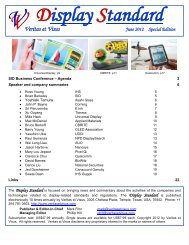You also want an ePaper? Increase the reach of your titles
YUMPU automatically turns print PDFs into web optimized ePapers that Google loves.
<strong>Veritas</strong> <strong>et</strong> <strong>Visus</strong> <strong>Display</strong> <strong>Standard</strong> February 2009<br />
Indian OLPC “rival” is a farce<br />
It was supposed to be a laptop computer. It was supposed to cost $10. It was supposed to come with 1GB memory<br />
and wireless connectivity. And it has been designed to rival OLPC’s XO-1. At the time of writing only the last<br />
statement could be confirmed as true and the first two have been confirmed as false, even though the backers are<br />
still making the “laptop” claim. This is the sorry tale of India’s “$10 laptop”. Billed as India’s home-grown XO-1,<br />
the final result of the efforts of the brightest minds from two top Indian universities has been dubbed “a damp<br />
squib” by the Times of India, a “hoax” by Indian technology journalist Randeep Ramesh and, in what might<br />
actually be an unbiased piece of journalism, as a “nearly useless brick” by Fox News. Although the full specs are<br />
still not available, those released so far suggest that this 10x5-inch device is little more than a pen drive the size of a<br />
modem. Despite this, the “nearly useless brick” is to be rolled out to thousands of Indian schools, colleges and<br />
universities to develop e-learning and improve literacy rates. Electronic classrooms are being s<strong>et</strong> up and free access<br />
to online textbooks has been secured, as are improvements to Intern<strong>et</strong> access (which isn’t free but is being<br />
subsidized). In a month that has finally brought some good news for the beleaguered OLPC project it is hard not to<br />
respond to this news with a wry smile, but ultimately it is the Indian people whose tax dollars have been wasted<br />
who will pay the price - whatever that price turns out to be.<br />
Will Obama sign up to Basel?<br />
Far be it from this column to ignore the political event of the year, so congratulations to the USA for electing the<br />
president that the rest of the world deserved. But does this have any implications for the USA’s deplorable record<br />
on e-waste? The good news is yes. Whilst still a senator, in 2008 Obama co-sponsored a bill banning the export of<br />
mercury, so he clearly knows a thing or two about toxic substances, and the signs are that he will act to close two<br />
gaping holes in US waste policy. One will be federal-level WEEE legislation, a task that grew more complicated in<br />
the dying years of the Bush administration as many states developed their own bills, resulting in a patchwork of<br />
different legislation that will require significant effort to mesh tog<strong>et</strong>her. It currently appears that the US may sign<br />
Basel Convention in Obama’s first year in office. 2009 will mark the 20th anniversary of the Convention, which<br />
has largely failed to achieve its goals – in no small part due to the lack of a US Presidential signature and a lack of<br />
commitment from those nations that did sign up. Arguably this is a symbolic gesture that will have little impact<br />
outside the US and those nations that have been on the receiving end of its e-waste exports, although the impacts on<br />
both will be significant, but symbolic gestures made in symbolic years can som<strong>et</strong>imes have far-reaching effects.<br />
Washington State introduces e-waste fee<br />
Move over California. Washington has become the first state to require electronics manufacturers pay for recycling<br />
of TVs, computers and other e-waste. The new legislation, which is similar to that in the WEEE Directive, preempts<br />
the rumored federal-level legislation but it remains to be seen how many other states will continue to go it<br />
alone.<br />
Oregon s<strong>et</strong> to ban disposal of all computers, monitors and TVs<br />
Oregon E-Cycles, established by Oregon’s Electronics Recycling Law (ORS 459A.300-.365), is a new statewide<br />
program that requires electronics manufacturers to provide responsible recycling for computers, monitors and TVs.<br />
Product stewardship directs everyone involved in the life cycle of a product to take shared responsibility for the<br />
impacts to our health and environment that result from the production, use, and end-of-life management of the<br />
product. Oregon E-Cycles provides free recycling of computers, monitors and TVs to anyone bringing seven or<br />
fewer items to a participating collection site at one time. However, collection sites may accept more than seven<br />
items from households, small businesses and small non-profits with 10 or fewer employees. Effective January 1,<br />
2010, all computers, monitors and TVs will be banned from disposal in Oregon. Manufacturers must label their<br />
computers, monitors and TVs with a visible, permanently affixed brand, and register those brands with DEQ. All<br />
manufacturers are required to pay a registration fee, which covers DEQ’s administrative costs to implement Oregon<br />
E-Cycles. Manufacturers choose to either pay a recycling fee to participate in the DEQ-administered State<br />
Contractor Program or, if they me<strong>et</strong> certain requirements, to implement and pay for their own statewide program.<br />
http://www.deq.state.or.us/lq/ecycle/moreabout.htm<br />
80






